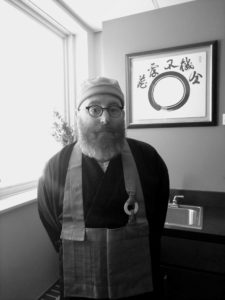- Saturday - July 16th, 2022 @ 8:00 am – 6:00 pm
In this daylong retreat led by Rev. Koji Acquaviva we will forge a connection with the joy and ease which must fuel our practice if we're to awaken to wisdom and compassion. Practices will be tailored to increase relaxation which in turn helps us want to practice more and also helps stabilize the mind for insight.
difficult thing is to make our mind balanced. Difficult though it may be to keep
the precepts and maintain pure conduct, the most difficult thing is to make our
physical conduct balanced. If it were valuable to grind our bones to powder,
the many who have endured such austerities since ancient times would have
attained Gautama Buddha’s teachings, but few people really have attained
since ancient times would have attained the truth. The reason is that it is very
difficult for a person to make their mind balanced.” (Shobogenzo Gakudo Yojinshu)
AZC is committed to making practice and the teachings available to all. Please contact Administrator Maida Barbour at 512-452-5777 or email admin@austinzencenter.org if event fees are a barrier to participation for you.
 Koji Acquaviva is a Soto Zen priest and the current director of Clouds in Water Zen Center in St. Paul, Minnesota. He began his monastic training in 2003 at the age of 21 and spent the next ten years as a resident of the San Francisco Zen Center. He has served as resident teacher of Mid City Zen in New Orleans and as visiting teacher of the Austin Zen Center. In addition to Soto Zen, he’s studied Vedanta and Tibetan Buddhism as an ashram and temple resident. His primary interest is encouraging students of Zen to feel empowered to develop their own syncretic practice paths, availing themselves to whatever methods they feel are potent.
Koji Acquaviva is a Soto Zen priest and the current director of Clouds in Water Zen Center in St. Paul, Minnesota. He began his monastic training in 2003 at the age of 21 and spent the next ten years as a resident of the San Francisco Zen Center. He has served as resident teacher of Mid City Zen in New Orleans and as visiting teacher of the Austin Zen Center. In addition to Soto Zen, he’s studied Vedanta and Tibetan Buddhism as an ashram and temple resident. His primary interest is encouraging students of Zen to feel empowered to develop their own syncretic practice paths, availing themselves to whatever methods they feel are potent.
Share this:
- Click to email a link to a friend (Opens in new window) Email
- Click to share on Facebook (Opens in new window) Facebook
- Click to share on Telegram (Opens in new window) Telegram
- Click to share on Bluesky (Opens in new window) Bluesky
- Click to share on X (Opens in new window) X
- Click to share on LinkedIn (Opens in new window) LinkedIn

